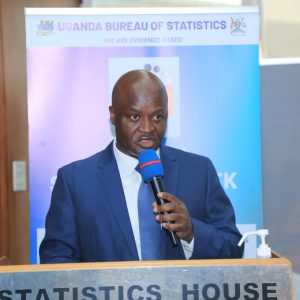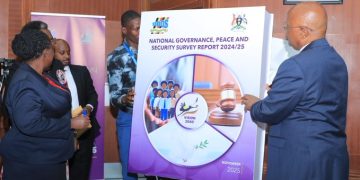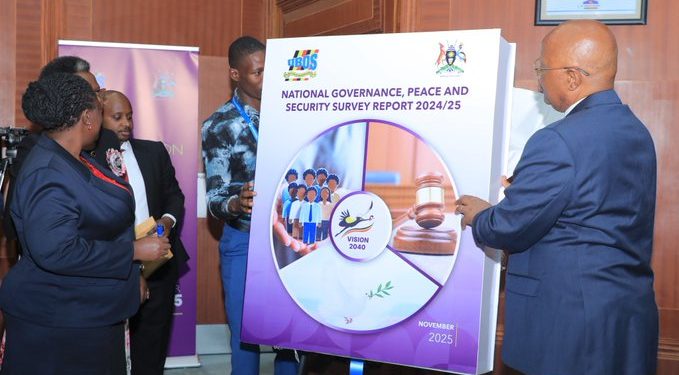The Uganda Bureau of Statistics (UBOS) has released the findings of the National Governance, Peace and Security Survey 2024/25, indicating 89% of the people (18+ years) are aware of their Human rights.
The awareness is highest in Tooro at 99.1% and lowest in Karamoja at 67.3%. 17% of the people claimed violation of rights
The survey was presented by Sharon Apio, Head of Demography and Social Statistics at UBOS, during celebrations marking African Statistics Day on November 18. Apio’s presentation focused on three core areas: awareness and trust in justice institutions, citizen participation in governance and democracy, and transparency and accountability in public service delivery.
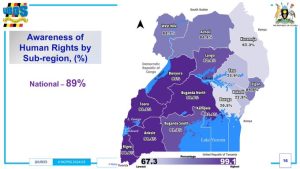
Justice Institutions: Awareness and Trust Rising
The survey indicates significant increases in both awareness and trust of Uganda’s justice institutions since 2017.
Awareness: Uganda Police Force: 69% (2017) → 89% (2024-25) and Local Councils: 72% (2017) → 97% (2024-25). Trust: Administrator General’s Office: 26% → 73%, Police: 70% → 78% and Overall trust in all judicial institutions: 79% → 93%.
Despite these gains, the survey highlights that 9% of respondents reported being coerced from seeking justice, with men (11%) more affected than women (8%). Coercion was slightly higher in rural areas, primarily influenced by family members and traditional leaders (8% each).
Patriotism Programs and Civic Engagement
Apio also reported on citizen awareness of government programs aimed at promoting patriotism, national unity, and socio-economic transformation.
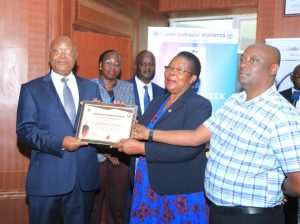
Only 49% of respondents were aware of patriotism programs in their district or city, though 79% believe patriotism is important for improving livelihoods, and 88% believe it helps reduce corruption. Awareness was higher among educated individuals, but the belief in the value of patriotism was broadly consistent across gender and residence.
Democracy, Voting, and Electoral Systems
The survey further examined citizen participation in democracy and electoral processes. Awareness of the right to vote: 94% of adults aged 18+.
Voter registration (2021 elections): 16% of eligible adults did not register, with non-registration highest among women, urban residents, and degree holders. Reasons included lack of proper identification (36%), lack of time (14%), and missing registration deadlines (10%).

Voter information: 75% were able to check the voter register, with the highest coverage in Toro (85.9%) and Ankole (85.7%), and lowest in Karamoja (59.1%). Only 33% of respondents reported being informed on how to correctly mark ballot papers.
Governance, Transparency, and Service Delivery
The survey highlighted both improvements and ongoing challenges in governance and accountability. Trust in public institutions generally increased, though public service trust slightly declined in some areas (e.g., Mayors and LC3s, from 62% → 59%).
Perception of leader responsiveness: MPs perceived as listening to citizens increased from 32% (2017) to 39% (2024-25), and local leaders’ responsiveness saw modest gains.
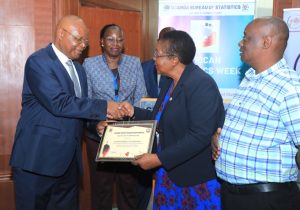
Service delivery: 69% feel local authorities deliver services effectively, up from 66% in 2017.
Accountability: Citizens feeling empowered to demand accountability rose from 10% → 30%, and awareness of community committees monitoring service delivery increased from 18% → 31%. Only 16% were informed about local council fund utilisation.
Corruption and bribery: 14% reported paying a bribe for services that should be free, with the highest rates in Elgon (24.4%), Bukedi (22%), and Lango. Awareness of anti-corruption efforts stood at 57%, with knowledge of anti-corruption bodies at 45% (up from 43% in 2017).
Emphasis on Evidence-Based Policy
Sharon Apio concluded her presentation by emphasising the importance of translating survey insights into actionable policies and programs, before handing over to her colleague Asa to cover peace and security aspects of the report.
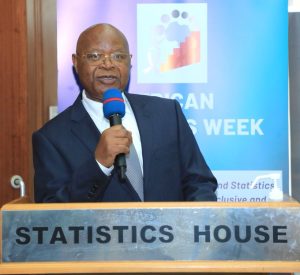
UBOS Chief Statistician Dr Chris N. Mukiza applauded the work of data collectors and stakeholders, highlighting the survey’s rigorous methodology and adherence to international statistical standards.
“Data collection requires walking the mile into different communities to gather accurate information,” he said. “We urge all stakeholders to use this data responsibly for evidence-based planning, policy formulation, and decision-making. The National Governance, Peace and Security Survey 2024/25 is rigorous, adhering to international statistical principles, and its insights are vital for the country’s development.”
Dr Paulina Chiwangu, UN Women Country Representative in Uganda, praised UBOS for its collaboration in the survey. “UN Women partnered with UBOS to ensure the survey captured critical insights,” she said. “It is encouraging that digital technology, including Computer-Assisted Personal Interviewing (CAPI), was used. Let us ensure these findings do not remain on paper but drive real actions to improve the lives of women and girls.”
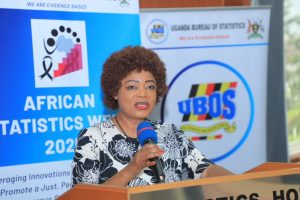
Dr Dorothy Kyeyune Byabazaire, representing the Uganda Blood Transfusion Services, commended UBOS for its corporate social responsibility initiatives. “In the last eight years, UBOS’s voluntary blood donation drives have collected 5,429 units of blood, saving countless lives,” she noted.
“This effort supports children with severe anaemia, accident victims, cancer patients, and those undergoing heart surgeries. UBOS demonstrates that statistical institutions can also serve humanity.”
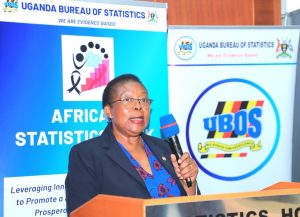
Mr Collins Omondi from the East African Community (EAC) secretariat highlighted that behind every number and graph are human stories and struggles, and these shape the African continent.
“African unity… is not just rooted in treaties, but rather in shared humanity. A prosperous East African Community can’t be built without first addressing Peace and Justice,” he noted.
The survey is the third in the series, following previous editions in 2014 and 2017, and reflects Uganda’s ongoing efforts to monitor governance, peace, and security trends at national and regional levels.
